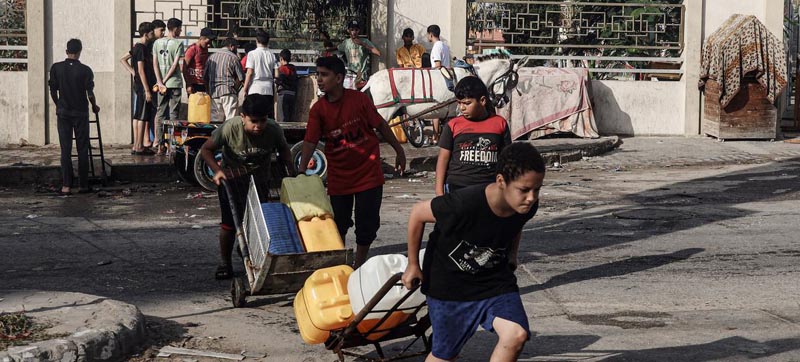 Israel-Gaza
Israel-Gaza
Israel-Palestine crisis: Humanitarians say ‘enough is enough’
With the deepening Israel-Palestine crisis about to enter its second month, a dozen UN agencies have reiterated urgent appeals for an immediate humanitarian ceasefire to allow more lifesaving aid into Gaza.
Among those uniting behind the message that “enough is enough”, UN relief chief Martin Griffiths renewed earlier pleas for the immediate and unconditional release of the more than 240 hostages captured by Hamas and held in Gaza since 7 October.
All parties should respect their obligations under international humanitarian and human rights law, the UN agency leaders insisted, amid media reports of huge explosions from airstrikes across northern Gaza overnight.
“Civilians and the infrastructure they rely on – including hospitals, shelters and schools – must be protected”, they said.
An ‘outrage’
In their joint statement, the global humanitarian leaders called the killings of large numbers of civilians in Gaza an “outrage”. So too was the fact that the Strip’s 2.2 million residents continue to be cut off from food, water, medicine, electricity and fuel.
According to the Ministry of Health in Gaza, the death toll since 7 October has reached 9,770 including 4,008 children and 2,550 women, the UN humanitarian affairs coordination office (OCHA) reported.
Some 2,260 people, including 1,270 children, are reported missing in the enclave, with most presumed to be trapped under the mounting rubble.
The humanitarian officials stressed that “an entire population is besieged and under attack, denied access to the essentials for survival, bombed in their homes, shelters, hospitals and places of worship”.
“This is unacceptable,” they insisted.
Solar panels hit
OCHA reported that in Gaza people are braving airstrikes to line up outside bakeries in the hope of buying bread, while power sources continue to dwindle.
Multiple solar panels on the roofs of buildings, particularly in Gaza City, have reportedly been destroyed by Israeli airstrikes in the past few days, OCHA said. This has eliminated one of the remaining sources of energy for hospitals and water and food production as fuel continues to be banned from entering the Strip by the Israeli authorities.
Attacks on healthcare
As of Sunday evening, OCHA reported that “in the past 24 hours, strikes continued in the close vicinity of hospitals, including the Indonesian Hospital (Beit Lahiya) and the Al Quds Hospital in Tal Al Hawa (Gaza City)” resulting in injuries and damage, while the Israeli military claimed that “members of armed groups have been shooting from those areas”.
More than 100 attacks on healthcare, killing or injuring close to 1,000 people, have been reported as of 4 November according to UN health agency WHO.
UN chief António Guterres said on Friday that he was “horrified” by a reported attack in Gaza on an ambulance convoy outside Al Shifa hospital en route to the Rafah border crossing, where medical evacuations of injured patients to Egypt had started last week.
The strike was also condemned by WHO, which recalled that attacks on healthcare, “including the targeting of hospitals and restricting the delivery of essential aid such as medical supplies, fuel, and water”, may amount to violations of international humanitarian law.
No safe haven for the wounded
While 14 out of 35 hospitals in Gaza have stopped functioning, more than 23,000 people have been injured in Gaza since 7 October and require treatment.
OCHA said that Friday’s attack on the ambulance convoy was followed by a complete halt in the exit of dual nationals and wounded people through Rafah.
No further evacuations were reported from Gaza over the weekend, OCHA said, owing “to the failure of Hamas, Israel and Egypt to reach an agreement regarding the safe evacuation of patients from northern Gaza”.
Diseases on the rise
Massive displacement prompted by an Israeli Defence Forces’ order to Gazans to leave Gaza City and the north of the enclave on 13 October has aggravated the already fragile health situation in Gaza.
Over 700,000 of the 1.5 million internally displaced people across the Strip are sheltering in 149 facilities run by the UN agency for Palestine refugees (UNRWA), which are severely overcrowded.
Several cases of acute respiratory infections, diarrhoea and chicken pox have been reported among people taking refuge at UNRWA shelters.
A water shortage that’s particularly acute in the north of the enclave “raises concerns of dehydration and waterborne diseases due to water consumption from unsafe sources”, OCHA warned, while hits on three sewage pipelines in Gaza City last week pose an “imminent risk of sewage flooding” according to municipal authorities.
No access to the north
UNRWA has deplored the fact that its shelters have been repeatedly hit by Israeli fire and are no longer safe for those seeking refuge there. On Saturday, an UNRWA school in Jabalia camp north of Gaza City was directly hit by strikes which killed 15 people and injured 70.
The agency said that over 160,000 displaced people were sheltering in 57 of its facilities in Gaza City and the North Gaza governorate, as of 12 October, before an evacuation order was issued by the Israeli Authorities.
However, UNRWA warned that it “is not able to access these shelters to assist or protect the internally displaced persons and does not have information on their needs and conditions”.
Since 7 October the agency has mourned the loss of 88 of its own staffers – the highest number of United Nations fatalities ever recorded in a single conflict.
Support Our Journalism
We cannot do without you.. your contribution supports unbiased journalism
IBNS is not driven by any ism- not wokeism, not racism, not skewed secularism, not hyper right-wing or left liberal ideals, nor by any hardline religious beliefs or hyper nationalism. We want to serve you good old objective news, as they are. We do not judge or preach. We let people decide for themselves. We only try to present factual and well-sourced news.







